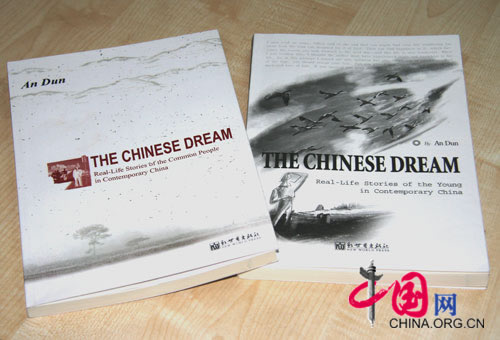
An Dun (the pen name of Zhang Yingjie) is a veteran journalist for Beijing Youth Daily and the author of a collection of books about the emotional lives of ordinary Chinese people. Her first interview collection, Absolute Privacy, created a sensation when it was published in 1998. At the time, the very word "privacy" had a negative connotation in China and few books dared to directly address personal issues such as relationship and divorce.
In 2009, two new volumes of book seriesThe Chinese Dream, Real-life Stories of the Common People in Contemporary China and Real-life Stories of the Young in Contemporary China were published in Chinese and English editions. They will feature at the Frankfurt Book Fair in October.
Things have changed a lot in ten years. These days, TV programs routinely talk about relationships and the Internet offers a platform for people to express their emotions. But An Dun's dream has not changed.
"Doors opened and I walked through"
An Dun began recording ordinary people's lives in the mid-1990s. She recalls that until then she had led a quite ordinary life, progressing smoothly from kindergarten through school and college to the world of work and family. "Doors opened and I walked through," she said, implying it was all rather too simple. She loved literature and knew she wanted to be a writer, but felt hampered and frustrated by her lack of life experiences.
She found a unique way to compensate - by talking to almost everyone she met. She started by hanging around outside a registry office requesting interviews from people who had come to file divorce papers. Naturally, most people turned her down, but over time she met several who were prepared to tell their stories. Her gambit paid off. Now people all over China contact her by phone and email, eager to tell their stories. "This reflects how people have changed, and how the country has changed," said An Dun.
Dreams of ordinary people
Her two new books started life in 2007 as a project supported by China International Publishing Group (CIPG) subsidiary, New World Press, to present a different side of China to the world. The 24 stories finally included in collections were carefully selected by An Dun from dozens of interviews carried out in 2007-2008. She told China.org.cn: "I try not to make judgments in the book. I wanted to let people preserve their own style and values. But the selection itself reflects my judgment." When asked how she selected the material, she said,: "It's probably going to disappoint you but my criteria were no criteria at all. Maybe it's because of my career as a journalist, but I can tell when I meet someone whether their story is worth digging into. One definite principle is, if he or she is representative of a group, I'll do it."
None of the stories in The?Chinese Dream are about celebrities. The heroes and heroines include a human rights lawyer who champions the rights of migrant workers, a volunteer working with drug addicts, a college graduate who broke up with his girlfriend because they had nowhere to live, one of the first journalists to reach the epicenter of the Sichuan earthquake, and so on.
An Dun said: "As a journalist, I treasure the right to speak and write. There are so many people jostling to interview celebrities. And famous people say the same thing over again thousands of times. It's not what I want to do. I want to help the unknown get their voices heard."
The original idea of the project was to produce a volume on young people in China. After long discussion, the team decided to include another volume on the dreams of ordinary Chinese. "They are like stars in the sky. Their light may be faint, but they never stop shining. Their stories express personal struggles. Some people may say the stories reflect the dark side of society and human nature, but they actually convey the same idea; truth, love and kindness can conquer all, and people's destinies are in their own hands."
Talking about her readers, An Dun said: "It was interesting that the book was well received among overseas Chinese but not quite so popular with mainland readers. Volunteers helped sell hundreds of books in Taiwan, the US and other areas. Many overseas Chinese realize China has changed too quickly since it opened to the world. The values of Chinese people are closely connected to modern world and they want to read the book to understand the changes that have taken place. I can't explain why mainland readers are less interested."
A third book is on the drawing board. An Dun told China.org.cn that, if possible, she'd like to explore people who have left their hometowns. It will not focus on migrants to big cities such as Beijing and Shanghai but will cover the whole process of the massive restructuring of the Chinese labor force. It will contain the dreams of 100 Chinese people and will be finished in 2 to 3 years.
"The first time I heard the idea of writing a book about Chinese dreams, I instantly recalled a book called The American Dream that I had read 20 years ago. Right away I decided there should be a book about the Chinese dream. Today I have realized that dream. So the 100th person in the book should be me." An Dun said with a smile.
(China.org.cn by Ren Zhongxi, September 18, 2009)